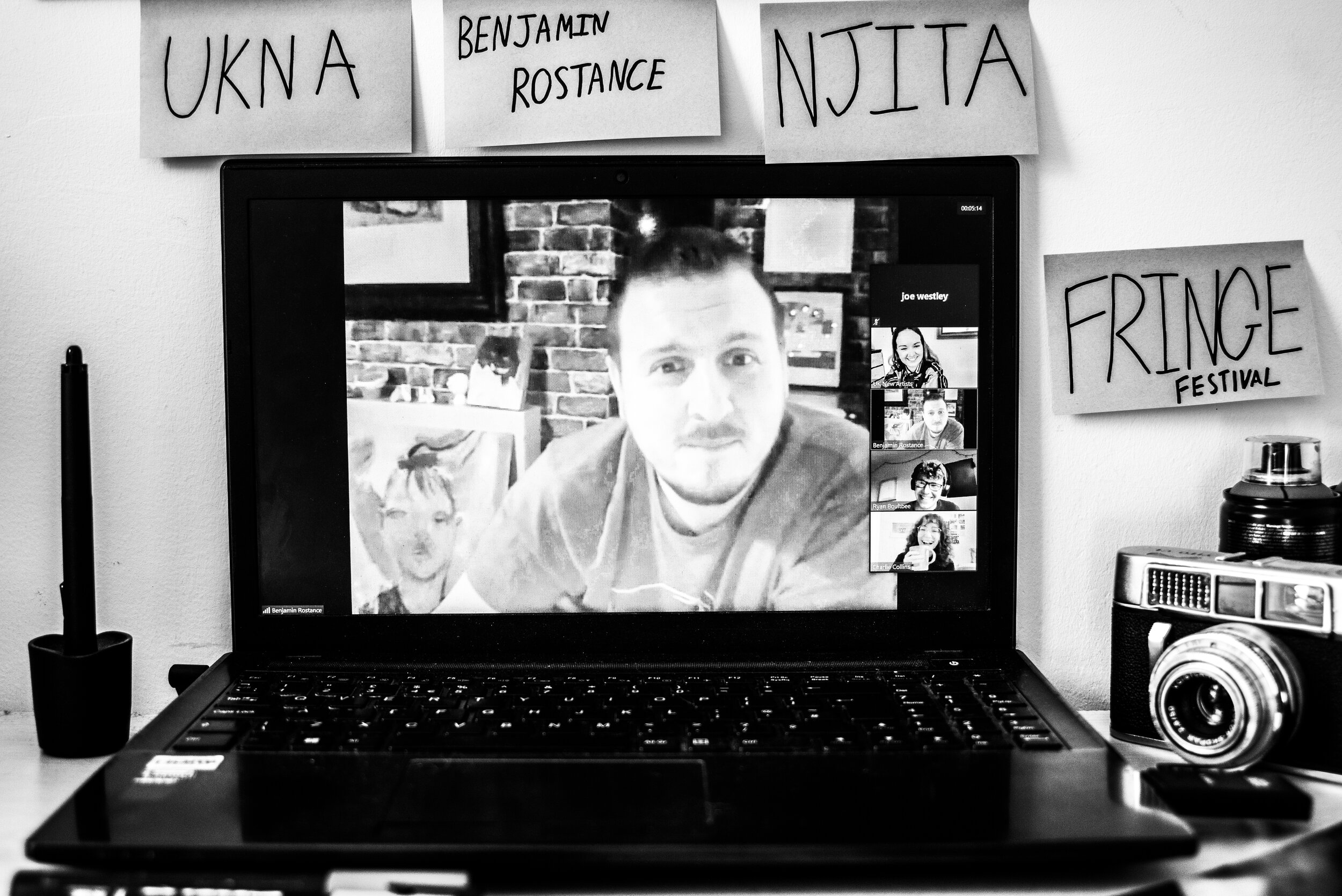‘De-Risking the Arts’
No Jobs in the Arts Fringe Festival Provides Important Opportunities to Early-Career Creatives
by Kellymarie Palfrey
Donna Briscoe-Greene: Where to? By Joe Westley
For two days at the end of February, No Jobs in the Arts (NJITA) hosted their online Fringe Festival which featured talks, workshops and events aimed at and delivered by early-career creatives. The festival had originally been planned as an in-person event to coincide with UK New Artists’ City Takeover, in Leicester, but due to the ongoing lockdown restrictions the festival organisers had to rethink the event and translate it to an online format.
Whilst it is obviously unfortunate that the Fringe was unable to go ahead as a physical in-person event, there is much to be said for it continuing in an online format. It was immediately clear to me that at the very heart of the Fringe Festival was the desire to give opportunities, experience, guidance and a chance to network with early-career creatives, like myself.
‘What can NJITA do for you?’ was the question asked of us during the public evaluation session at the start of the second day of the festival. After having experienced the previous day’s events and before diving into the upcoming sessions, it seemed an ideal time to pause and reflect on what the festival was actually doing, and how NJITA could help or assist early-career creatives in other ways. What exactly did we need from NJITA going forward? How can we help to shape the future of NJITA so that it best serves us? These were just some of the questions raised and discussed during the informative session which provided the opportunity for all participants to offer feedback in real time.
The Fringe Festival organisers, Ryan Boultbee and Charlie Collins, spoke in the session about their aim to ‘de-risk’ the arts sector by providing small scale opportunities for creatives to gain experience with guidance. For me, the Fringe achieved this and more. The Fringe not only provided a space for early-career creatives to lead arts workshops, there were also various sessions focused on providing attendees with a safe space to discuss their anxieties, worries or any general questions about their practice with a seasoned professional; such as Donna Briscoe-Greene’s “Where to?” workshop and Benjamin Rostances “Generosity Session: A Mindful Approach to Engaging with Crit Sessions”.
“The whole festival felt collaborative, it wasn’t simply a case of showcasing early-career creatives in the East Midlands but rather a chance for those delivering workshops to trial ideas, and those attending the talks and workshops to gain confidence, skills and the ability to network. It was, indeed, a risk free way to gain experience in the arts.”
Benjamin Rostance: Generosity Session, by Joe Westley
Perhaps NJITA’s ‘de-risking’ approach to the Fringe Festival resonates with me on a deeply personal level because, like many others involved in the festival, this was my first professional gig in the arts sector. The Fringe provided me with the opportunity to be an arts writer in residence for the two-day festival; suddenly I was being paid to write and provided with a platform for my writing. The whole experience for me was overwhelmingly positive and I was pleased to see a real sense of community amongst the primarily midlands based creatives who participated. I have gained, amongst other things, the confidence that I needed to pursue a career in the arts, and the all important experience to help me get my foot in the proverbial door to the arts world.
So, why was the Fringe Festival such an important event for early-career creatives? Experience. The Fringe came at a time when many arts organisations, galleries, museums and such have been closed for the majority of the last year and opportunities for any kind of work experience have been scarce. Even before the ongoing pandemic, gaining valuable experience in the arts was difficult, and for some impossible. A 2018 study by the Sutton Trust revealed that 86% of arts internships in the UK were unpaid. Whilst there have been some improvements since 2018, the arts sector still leaves a lot to be desired when it comes to ensuring everyone is able to undertake internships and gain experience. I know first-hand how difficult and demoralising it can be to know that you would benefit from certain opportunities but are unable to participate in them because you cannot live in London, or anywhere for that matter, for six months without income. I cannot express enough how important it is to give paid internships and opportunities to new and early-career creatives; I would shout it from the top of my lungs in every gallery, museum and arts organisation still offering unpaid internships, if I was currently allowed anywhere other than my living room and local shop, of course. At a time when paid internships are rare and highly competitive, the Fringe gave those involved a chance for micro sessions of paid work experience. It is through opportunities such as this that people without the financial security needed to undertake an unpaid internship can gain vital skills and experience, and more importantly are given space to fail, learn and grow without pressure or fear of repercussions.
However, I do feel it is also important to note that in being an online event the Fringe Festival unfortunately would have created boundaries and accessibility issues for those unable to access the internet. So, whilst I can enthusiastically say that the Fringe was offering opportunities to many, it wasn’t open to all. This is something that was acknowledged by the organisers in their evaluation session and it is one of the more unfortunate side effects of the transition to an online event in the wake of the Covid-19 pandemic. I am not sure how NJITA could have addressed this imbalance with the restrictions in place during this year's festival. However, I am sure that they have taken on board the feedback from the evaluation and will work to make any future events (and hopefully future Fringe Festivals?) as accessible as is possible.
Despite this, Fringe Festival made very positive steps towards a fairer, more accessible and more diverse arts sector. The organisers and everyone involved in delivering this project deserve to be proud of the positive impact that they have had, and will continue to have, on those who participated. Diversifying the arts will take time and will need a commitment from organisations across the sector, but it can be done. In offering small scale opportunities and micro-experiences through the Fringe Festival, NJITA has begun to break down the barriers of the arts world; I only hope that they continue to do so.
About the Author:
Kellymarie is an emerging arts writer based in Nottingham who has recently graduated from her masters degree in art history. She currently writes reviews for LeftLion’s art section and is developing a multimedia project that seeks to make arts writing and criticism more accessible.
You can follow Kelly on Instagram (@kellymarie_palfrey)
-
Images:
Joe Westley and Jasmine Storey were commissioned to capture their experience of the No Jobs in the Arts Fringe Festival from their homes. Their images are used to illustrate this article.
-
Notes:
Kelly references a 2018 study by the Sutton Trust revealing that 86% of arts internships in the UK were unpaid. The source for this data was taken from Carl Cullinane and Rebecca Montacute’s “Pay as you go? Internship pay, quality and access in the graduate jobs market” by The Sutton Trust, 2018.


